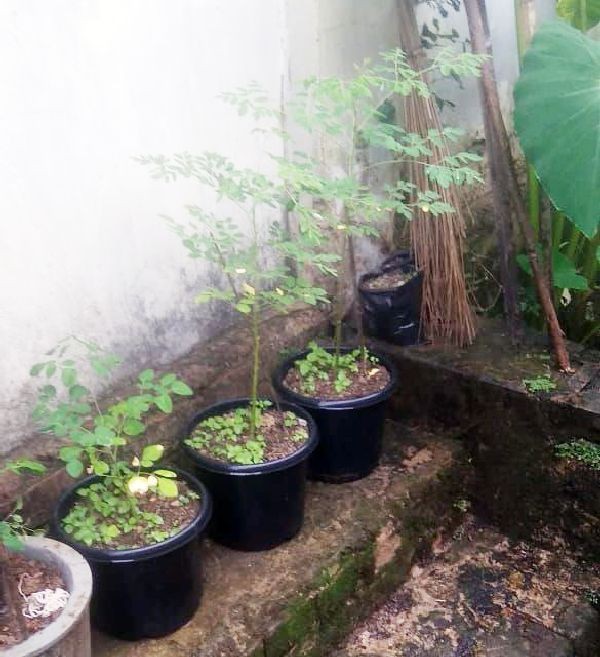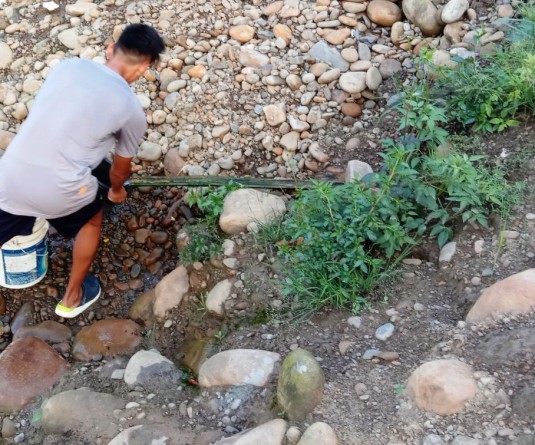Some Moringa oleifera saplings planted by Rokobikho Savino.

Atono Tsükrü Kense
Kohima | September 29
The COVID-19 pandemic has undeniably raised health consciousness among the populace with more and more people switching to healthier locally available foods that boost the immune system.
With no medicine and cure till date, humans across the globe are compelled to change their attitudes and their ways to adapt to the new normal. As such, an increasing number of people are turning to vitamins and supplements made from herbs and plants to try and stay healthy.
Likewise, people in the small state of Nagaland are making smarter food choices and switching to healthier foods and greens that give maximum health benefits. There have been instances of people going through the length and breadth of fields and jungles searching for herbs and plants, which are said to have many health benefits as well as to cure certain ailments.
Among the list of such sought out plants, the Moringa oleifera designated by some as a ‘miracle tree or super food,’ which has been used for medicinal purposes for over thousands of years is said to have numerous health benefits.
Some even claim that it can prevent 300 known diseases.
Many supplement industries across the globe have been manufacturing food supplements made of Moringa oleifera at high prices, garnering a huge consumer base even in a small state like Nagaland.
In the midst of the craze for this ‘super food,’ The Morung Express caught up with a farming enthusiast, Rokobikho Savino, who left his job as a lecturer to run his own business— Gwizan Organics & Technologies in Kohima.
Hailing from Rüzaphema village, Savino said he procured Moringa seeds from Gujarat in July and planted them after realising its multiple benefits.
Terming the plant a ‘miracle tree,’ he said it is growing very well.
When enquired if this plant is found in the state, Savino said that it was once available in the wild but no one ever thought of or tried to collect. He expressed doubt that it would be available in the forests and jungles today.
He also informed that there are various kinds of Moringa and he had chosen the superior variety called PKM1 and PKM2 for commercial production.
The good thing about this tree, he explained was that every part of the plant is used from the leaves, stem, drumsticks, seeds and roots. This tree can be planted from March till October, he said.
Apart from boosting the immune system, Savino said it also aids in weight loss, gives instant energy, flushes out toxins, is good for skin and hair, improves digestion and gut health, and fights insomnia. It is a store house of nutrients, he maintained.
As the demand for Moringa is rapidly growing globally as the highly nutritious powder derived from the tree’s dried leaves, and the high-quality oil that can be extracted from the seeds, Savino claimed that it is also increasingly becoming the subject of interest from international organisations and institutions involved in the global fight against malnutrition.
The Moringa oil, he informed, is highly coveted by international pharmaceutical, beauty/cosmetic companies for its ‘excellent’ properties.
While suggesting that ‘our’ farmers should take up this plantation, Savino explained that planting can be done by stump cutting, direct sowing and by seedlings in polybags. The safest way, he said is raising saplings/seedlings and transplanting them or simply growing them in large flower pots in the kitchen garden. This way, the leaves can be cut or pruned on regular basis for consumption and the tree will not grow big, he added.
He was of the firm belief that cultivation of this easy to grow tree can provide better income for the farmers in the state.
Sensing huge opportunities in this, Savino commented that cultivation of this tree can create local job opportunities for local farmers through construction, operation, development and running of Moringa farms and industries.
Agricultural departments of local universities, related agencies and consultants can help in acquisition and dissemination of know-how and skills to run and develop Moringa farms on a larger scale, he maintained.





